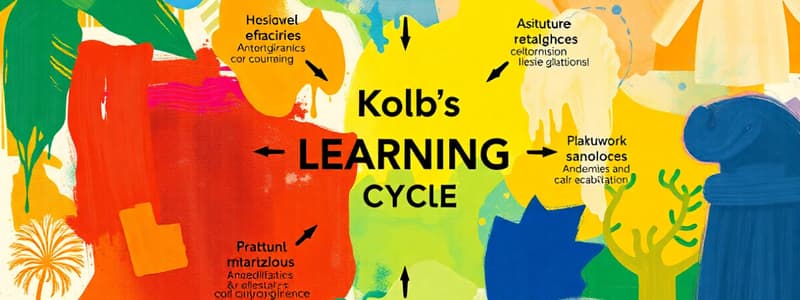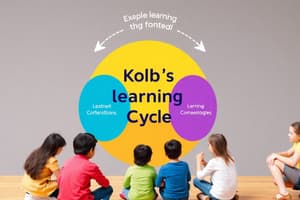Podcast
Questions and Answers
What was Evlyn's initial approach to boosting productivity at GlobalTech Ltd?
What was Evlyn's initial approach to boosting productivity at GlobalTech Ltd?
- Implementing stricter rules and structured workflows. (correct)
- Simplifying progress reports to focus on key achievements.
- Encouraging social interactions and team lunches.
- Introducing collaborative brainstorming sessions.
How did the team members respond to Evlyn's initial changes?
How did the team members respond to Evlyn's initial changes?
- Team morale remained neutral, and productivity stayed the same.
- Team morale improved, and productivity increased significantly.
- Team morale improved slightly, but productivity decreased.
- Team morale dropped; Pedro became distant, Katarzyna avoided meetings, Lucas struggled with motivation, and Andrei questioned leadership. (correct)
Which aspect of Kolb's Experiential Learning Cycle did Evlyn utilize to resolve the challenges faced by her team?
Which aspect of Kolb's Experiential Learning Cycle did Evlyn utilize to resolve the challenges faced by her team?
- Ignoring and suppressing emotions.
- Turning to Kolb's Experiential Learning Cycle to understand and resolve the situation. (correct)
- Ignoring all advice.
- Changing the team members.
What was Pedro's primary reaction to the stricter rules implemented by Evlyn?
What was Pedro's primary reaction to the stricter rules implemented by Evlyn?
What was Katarzyna's primary struggle with the changes implemented by Evlyn?
What was Katarzyna's primary struggle with the changes implemented by Evlyn?
What did Lucas miss the most after Evlyn implemented stricter rules?
What did Lucas miss the most after Evlyn implemented stricter rules?
Why was Andrei demoralized by the new environment created by Evlyn's initial changes?
Why was Andrei demoralized by the new environment created by Evlyn's initial changes?
In the context of Evlyn's reflections, what is the significance of verbal and non-verbal cues from the team?
In the context of Evlyn's reflections, what is the significance of verbal and non-verbal cues from the team?
What did Evlyn realize about effective leadership by comparing her initial assumptions with insights from organizational behavior theories?
What did Evlyn realize about effective leadership by comparing her initial assumptions with insights from organizational behavior theories?
What was one of the methods that Evlyn implemented when experimenting with a more flexible leadership style?
What was one of the methods that Evlyn implemented when experimenting with a more flexible leadership style?
What was the outcome of Evlyn's new leadership approach?
What was the outcome of Evlyn's new leadership approach?
What key lesson did Evlyn learn in relation to leadership?
What key lesson did Evlyn learn in relation to leadership?
According to Kolb's Experiential Learning Cycle presented in the text, what is essential for true learning to happen?
According to Kolb's Experiential Learning Cycle presented in the text, what is essential for true learning to happen?
How did Evlyn's perception of her team's performance change after implementing stricter rules, and what did she begin to consider in her reflections?
How did Evlyn's perception of her team's performance change after implementing stricter rules, and what did she begin to consider in her reflections?
How did the introduction of collaborative brainstorming sessions during meetings influencethe the team dynamic?
How did the introduction of collaborative brainstorming sessions during meetings influencethe the team dynamic?
What did Katarzyna learn to do to address restrictions of her professional freedoms?
What did Katarzyna learn to do to address restrictions of her professional freedoms?
Which statement explains how balancing clear guidelines with a supportive environment impacted Andrei's performance within the team?
Which statement explains how balancing clear guidelines with a supportive environment impacted Andrei's performance within the team?
What change did Evelynn make to the process of reporting?
What change did Evelynn make to the process of reporting?
Which one of these can not be considered one of the cities with a GlobalTech Ltd office?
Which one of these can not be considered one of the cities with a GlobalTech Ltd office?
Which of the following best reflects the challenge faced by Lucas due to the stricter rules implemented by Evlyn?
Which of the following best reflects the challenge faced by Lucas due to the stricter rules implemented by Evlyn?
What action exemplifies the 'Active Experimentation' stage of Kolb's learning cycle in Evlyn's approach?
What action exemplifies the 'Active Experimentation' stage of Kolb's learning cycle in Evlyn's approach?
What does Andrei's preference show about balancing structure and teamwork?
What does Andrei's preference show about balancing structure and teamwork?
Which of the following statements best describes how Kolb’s Experiential Learning Cycle supports leaders and team members in diverse workplaces?
Which of the following statements best describes how Kolb’s Experiential Learning Cycle supports leaders and team members in diverse workplaces?
Which action would Evlyn take in the first or "Concrete Experience" step?
Which action would Evlyn take in the first or "Concrete Experience" step?
What is the relationship between concrete experience, reflective observation, abstract conceptualization, and active experimentation in Kolb's Experiential Learning Cycle?
What is the relationship between concrete experience, reflective observation, abstract conceptualization, and active experimentation in Kolb's Experiential Learning Cycle?
Flashcards
GlobalTech Ltd
GlobalTech Ltd
A multinational company with a flexible work culture and supportive management with offices in London, Bucharest, Warsaw, Madrid, and São Paulo.
Team Morale Drops
Team Morale Drops
The decline in positive feelings, motivation, and enthusiasm for work among team members.
Kolb's Experiential Learning Cycle
Kolb's Experiential Learning Cycle
A four-stage cyclical model of learning through experience, reflection, conceptualization, and experimentation.
Concrete Experience
Concrete Experience
Signup and view all the flashcards
Reflective Observation
Reflective Observation
Signup and view all the flashcards
Abstract Conceptualization
Abstract Conceptualization
Signup and view all the flashcards
Active Experimentation
Active Experimentation
Signup and view all the flashcards
Leadership style
Leadership style
Signup and view all the flashcards
Adaptive leadership style
Adaptive leadership style
Signup and view all the flashcards
Intrinsic Motivation
Intrinsic Motivation
Signup and view all the flashcards
Self-efficacy
Self-efficacy
Signup and view all the flashcards
Team Cohesion
Team Cohesion
Signup and view all the flashcards
Emotional Intelligence
Emotional Intelligence
Signup and view all the flashcards
Organizational cuture
Organizational cuture
Signup and view all the flashcards
Group Dynamics
Group Dynamics
Signup and view all the flashcards
Adapting to diverse needs
Adapting to diverse needs
Signup and view all the flashcards
Collaborative Brainstorming
Collaborative Brainstorming
Signup and view all the flashcards
Building relationships
Building relationships
Signup and view all the flashcards
Ongoing learning
Ongoing learning
Signup and view all the flashcards
Morale improves
Morale improves
Signup and view all the flashcards
Increases steadily
Increases steadily
Signup and view all the flashcards
Respected
Respected
Signup and view all the flashcards
Valued
Valued
Signup and view all the flashcards
Collaboration
Collaboration
Signup and view all the flashcards
Communication
Communication
Signup and view all the flashcards
Study Notes
- The Kolb's Learning Cycle is demonstrated through a workplace dilemma.
- GlobalTech Ltd. is a multinational company known for its flexible work culture.
- GlobalTech has offices in London, Bucharest, Warsaw, Madrid, and São Paulo.
- Evlyn, a new team leader from Romania, joins GlobalTech.
- Evlyn comes from a background of hierarchy and discipline.
- Evlyn finds GlobalTech's team approach to be informal and collaborative.
The Team and Initial Changes
- Pedro is from Spain who is energetic, social, and thrives on teamwork and creativity.
- Katarzyna is from Poland who is precise, goal-oriented, and values autonomy.
- Lucas is from Brazil who is friendly, people-focused, and motivated by positive relationships.
- Andrei is from Romania who is structured, diligent, and appreciates team spirit.
- Evlyn implements stricter rules to increase productivity, including:
- Shorter lunch breaks
- Fewer social chats
- Mandatory daily progress reports
- Clear task assignments with minimal flexibility
- The team's morale drops as a result of Evlyn's changes.
- Productivity decreased and collaboration is strained
- Pedro becomes distant, Katarzyna avoids meetings, Lucas struggles with motivation, and Andrei questions Evlyn's leadership.
- Evlyn uses the Kolb's Experiential Learning Cycle to address the situation.
Step 1: Concrete Experience (The Challenge)
- Evlyn experiences the negative effects of her leadership style.
- The team disengages from the new model and productivity is below expectations.
- The team members' experiences include:
- Pedro feels his creativity is stifled by rigid rules.
- Katarzyna struggles with excessive monitoring, which limits her autonomy.
- Lucas misses the friendly, collaborative atmosphere.
- Andrei finds the lack of team spirit demoralizing, despite appreciating structure.
Step 2: Reflective Observation (What's Happening?)
- Evlyn observes the impact of her decisions, paying attention to verbal and non-verbal cues.
- Observations found:
- Pedro's energy decreases during meetings.
- Katarzyna submits her work on time but avoids discussions.
- Lucas interacts less with his colleagues, affecting team cohesion.
- Andrei's performance remains steady, but his engagement fades.
- Evlyn questions why the team's performance is declining.
- The team members reflected:
- Pedro: "Why do I feel less motivated when my creativity is restricted?"
- Katarzyna: "How can I maintain my independence within a structured system?"
- Lucas: "How can I stay motivated without the social connections I value?"
- Andrei: "Can I adapt to this new environment while maintaining my team spirit?"
Step 3: Abstract Conceptualisation (Understanding the Issue)
- Evlyn connects her experiences with organizational behavior theories.
- Evlyn discovered that cultural backgrounds and personal preferences shape responses to leadership styles.
- Pedro's need for creativity aligns with theories of intrinsic motivation and self-expression.
- Katarzyna's preference for autonomy reflects concepts of self-efficacy and job control.
- Lucas's emphasis on relationships ties to team cohesion and emotional intelligence.
- Andrei's balance of structure and teamwork relates to organizational culture and group dynamics.
- Effective leadership involves adapting to diverse needs.
- The team members also gain new perspectives:
- Pedro understands that creativity can still thrive within certain boundaries.
- Katarzyna learns to communicate her need for autonomy more openly.
- Lucas realizes the importance of maintaining social connections while meeting performance goals.
- Andrei recognizes the value of clear guidelines balanced with a supportive environment.
Step 4: Active Experimentation (Trying a New Approach)
- Evlyn experiments with a more flexible leadership style.
- She maintains clear performance goals but allows greater flexibility in methods.
- Team meetings include collaborative brainstorming sessions.
- Social interactions are seen as essential for building relationships.
- Progress reports are simplified, focusing on key achievements rather than daily checklists.
The Team's Response to New Approach
- Pedro uses brainstorming sessions to share creative ideas.
- Katarzyna enjoys the freedom to structure her workflow while meeting deadlines.
- Lucas feels more motivated from renewed sense of community and support.
- Andrei finds the balance between structure and teamwork both motivating and productive.
- The team's morale improves, and productivity increases steadily.
- Each member feels respected and valued improving collaboration, communication, and performance.
- Learning is an ongoing process.
- By combining experience, reflection, theory, and experimentation, Evlyn developed a more adaptive leadership style.
Conclusion: Learning Through Experience
- Kolb's Experiential Learning Cycle involves:
- Experience Challenges to push out of comfort zones.
- Reflect on What Happened to understand underlying causes.
- Apply Theories and Concepts to make sense of experiences.
- Experiment with New Approaches to improve outcomes.
- Leaders and team members can develop skills, insights, and confidence needed to thrive in diverse workplaces.
- Every experience-good or bad-is an opportunity to learn, grow, and succeed.
Studying That Suits You
Use AI to generate personalized quizzes and flashcards to suit your learning preferences.




